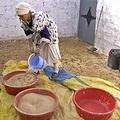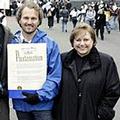 聯合國表示,全球有7億人的生活面臨缺水的窘境,而到2025年之前,這數字會上升到30億。聯合國秘書長潘基文在3月22日世界水資源日當天,呼籲整合跨國界水資源管理,因為世界上有很多條河流及其流域,都是由許多國家共享。潘基文說:「因為人口快速成長、非永續的消費模式、不良管理措施、污染、公共建設投資不足和缺乏效率的水資源使用等因素,使得可用水資源的供應受到箝制。」
聯合國表示,全球有7億人的生活面臨缺水的窘境,而到2025年之前,這數字會上升到30億。聯合國秘書長潘基文在3月22日世界水資源日當天,呼籲整合跨國界水資源管理,因為世界上有很多條河流及其流域,都是由許多國家共享。潘基文說:「因為人口快速成長、非永續的消費模式、不良管理措施、污染、公共建設投資不足和缺乏效率的水資源使用等因素,使得可用水資源的供應受到箝制。」
「未來將需要更多的水,來種植作物、提供乾淨的飲用水和衛生系統,供應工業以及支持城市的擴展,」潘基文表示,「水的供需落差越來越大,威脅著經濟和社會的發展,以及環境的永續。」 潘基文還說:「前面的路很清楚,我們要加強制度的效能及實施全面性的管理、促進技術轉移、動員更多資金來源,並且將優良的實務及學習經驗加以擴大。」
聯合國兒童基金會(UNICEF)執行長佛南曼(Ann Veneman)22日在紐約「為水而走」(Walk for Water)活動開幕時表示,有4億2500萬名18歲以下的孩子沒有足夠的水可使用。 在這項星巴克和礦泉水公司Ethos Water所舉行的活動中,佛南曼表示:「取得乾淨的飲用水對孩子的健康來說,是十分重要的。在世界上,有許多地方的女人和小孩必須行走很遠的距離,才能取得家庭所需的飲用、清潔和煮食的水。」
 在星巴克,每賣出一瓶Ethos礦泉水,星巴克基金會將捐獻5美分給Ethos Water基金會。星巴克希望在未來5年,至少能捐贈1000萬美元給參與水議題的非營利組織。
在星巴克,每賣出一瓶Ethos礦泉水,星巴克基金會將捐獻5美分給Ethos Water基金會。星巴克希望在未來5年,至少能捐贈1000萬美元給參與水議題的非營利組織。
企業團體及財政機構也加入聲援2007世界水資源日的行列。總部在突尼斯的非洲發展銀行(African Development Bank Group, AfDB),目前把水源及衛生下水道設備列為優先處理項目,以投注更多金額於「為非洲止渴」陣線中。 目前,在非洲的14個國家均蒙受水資源短缺的壓力,在北非尤其嚴重。非洲發展銀行表示:在人口增加、城市及經濟發展的規模均急速擴張的情形下,水資源的問題便愈發棘手。
世界銀行呼籲公有或私人資金增加此方面投資,以加強開發中國家裡的水安全問題,這些國家是主要受水資源短缺所苦的國家。世界銀行的能源、運輸暨水資源部門執行長塞格(Jamal Saghir)說:「在國家到達其生存的基本底限時,水扮演推動經濟發展的力量,比起因洪水或天然災害時所帶來的負面影響更為重要。」
在瑞士,世界保育聯盟(IUCN)發行一份新的出版品《付費——為流域設施設立付費機制》。這本新書設計了一般常用付費方式的各種類別,從私有交易到總量管制、認證及公共付費方案等,均有說明。「市場機制可以透過投資生態系統的永續經營方案,解決水域減少的問題,」IUCN水資源專案負責人伯坎克(Ger Bergkamp)表示。
世界上最大的瓶裝礦泉水公司法國維特(Vittel),每年提供2.45億美元給法國農民作為不施肥的補償金,這樣一來,使得瓶裝礦泉水源受污染的危險性大大地降低。IUCN指出,哥斯大黎加希利狄雅市(Heridia)的個人用水戶,在水費帳單中付費保護森林,以確保市內的健康水源供應所需。上游的地主則接受每年每公頃110美元的補助,以保持溪流中水質的潔淨。
Water scarcity is a fact of life for 700 million people around the world, a figure that could rise to more than three billion by 2025, according to the United Nations. In a message today marking World Water Day UN Secretary-General Ban Ki-moon called for integrated cross-border water management since many of the world's rivers and aquifers are shared among countries.
"Available supplies are under great duress as a result of high population growth, unsustainable consumption patterns, poor management practices, pollution, inadequate investment in infrastructure and low efficiency in water-use," said Ban.
"Yet even more water will be needed in the future - to grow food, to provide clean drinking water and sanitation services, to operate industries and to support expanding cities," he said. "The water-supply-demand gap is likely to grow wider still, threatening economic and social development and environmental sustainability." "The way forward is clear," said the secretary-general, "strengthening institutional capacity and governance at all levels, promoting more technology transfer, mobilizing more financial resources, and scaling up good practices and lessons learned."
Some 425 million of those without enough water are children under 18, said UNICEF Executive Director Ann Veneman, kicking off the Walk for Water Event in New York City today. "Access to clean drinking water is critical for the health of children around the world," said Veneman at the event organized by Starbucks Coffee Company and Ethos Water. "In many parts of the world women and children walk long distances to fetch water for their families for drinking, washing and cooking."
For each bottle of Ethos water purchased in Starbucks stores, five cents is contributed to the Ethos Water Fund of the Starbucks Foundation. These funds support Starbucks' goal of contributing at least $10 million over five years to non-profit organizations involved in water issues.
Businesses and financial institutions, too, are marking World Water Day 2007. In Tunis, the African Development Bank Group, AfDB, is prioritizing its water and sanitation operations to "quench Africa's thirst" for more investments to this sector. Currently, 14 countries in Africa are subject to water stress or water scarcity, with those in northern Africa facing the worst prospects. This situation is getting worse as a consequence of rapid population growth, expanding urbanization, and increased economic development, the AfDB said.
The World Bank today called for increased investments from private and public sources in order to enhance water security in developing countries which are projected to suffer the most because of water scarcity. "When countries reach this minimum platform, water becomes a driver of economic growth rather than a negative force associated with floods and natural disasters," said Jamal Saghir, World Bank director for energy, transport and water.
In Switzerland, IUCN-The World Conservation Union launched a new publication today entitled, "Pay – Establishing payments for watershed services." The new book lays out a range of payment schemes that are commonly used, from private trading, to cap-and-trade, to certification and public payment schemes. "Markets can solve watershed degradation through investments in the sustainable management of ecosystems," says Ger Bergkamp, head of the IUCN Water Programme.
French Vittel, the world's largest mineral water bottling company, already invests US$24.5 million per year to compensate farmers in France for reduced use of fertilizer. The result is a reduction in the contamination risk of the bottler's main source of water. In Costa Rica, individual water users in the city of Heridia pay through their water bills to protect the forests and watersheds on which Heridia's healthy water supply depends. Landowners upstream receive up to US$110 per hectare per year to safeguard downstream water quality, the IUCN explains.






